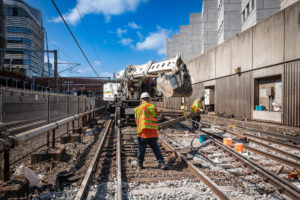
MBTA construction crews replace rails on the Orange Line's tracks near Ruggles Station in Boston in September 2022. MBTA photo.
With help from some large contractors, workers have completed close to 60 percent of planned maintenance and construction work about 18 days into the 30-day Orange Line shutdown, MBTA officials said Tuesday as Beacon Hill continues to sort through the aftermath of a stinging federal safety report.
After touring the Orange Line stop near Bunker Hill Community College in Charlestown with his top transportation deputies, Gov. Charlie Baker said the unprecedented project so far has gone “pretty much according to plan.” He added that he is “optimistic” passenger service will resume on Sept. 19, when the end-to-end closure is set to lift.
“There’s a lot of work left to be done between now and the 19th of September, but I do believe that the progress to date is pretty consistent with expectations,” Baker said.
MBTA General Manager Steve Poftak said “just under 60 percent” of maintenance work planned has been completed as of Tuesday, including 47 percent of rail replacements, 65 percent of track replacements, 91 percent of “special track work” and 55 percent of Oak Grove and Malden signal upgrades.
The T has 58 new, CRRC-manufactured Orange Line cars ready for service, which would make those vehicles the “predominant” model if service resumed today, Poftak said.
“We remain cautiously confident about getting all this work done and getting all this work done on time,” Poftak said.
As of Tuesday, the T is in position to lift two speed restrictions on stretches of the Orange Line following track work at Jackson Square, leaving four others to be addressed, Poftak said.
MBTA officials launched the shutdown amid a federal investigation that flagged safety problems across the system, including a backlog of deferred maintenance that has forced the T to institute speed restrictions up and down the Orange Line.
$36M for Orange Line Shutdown Contractors
Agency officials have in recent weeks been tight-lipped about the costs of the work, at first saying only that the MBTA would spend up to $37 million on shuttle buses to replace trains and forego roughly $3 million in fare revenue.
After the News Service last week submitted a public records request seeking contracts awarded for maintenance, repairs and other work related to the shutdown, MBTA spokesperson Joe Pesaturo on Tuesday said the T would use “a combination of MBTA crews and existing third-party contractors.”
“The major contractors involved in track and signal upgrades are Barletta, Middlesex Corporation, and Alstom,” Pesaturo said.
Pesaturo described three major contracts related to the Orange Line shutdown, together totaling about $36.4 million in value and each with several subcontractors involved.
Two contracts were programmed in the MBTA’s five-year capital investment plan: one awarded to Barletta Heavy Division for Wellington Yard track and signal upgrades with construction estimated at nearly $9.5 million, and another also awarded to Barletta for Oak Grove and Malden signal upgrades with a price of about $13.9 million.
The third contract Pesaturo listed is with The Middlesex Corp. for emergency track and infrastructure repairs, aimed at areas with speed restrictions highlighted by federal investigators. The MBTA estimated the total construction value of that contract is around $13 million.
That contract was not programmed in the 2023-2027 capital investment plan. Pesaturo said it was “competitively procured” but did not immediately provide details on when the MBTA selected a bid or awarded the contract.
The MBTA also did not make clear Tuesday the division of work and costs between internal crews and third-party contractors.
“There are 150 to 175 people working across the system at any given time. There are construction activities 24/7. Actual staffing, shifts, and work schedules depend upon individual projects, locations, and the nature of the work,” Pesaturo wrote in a statement to the News Service. “The MBTA and our contractors do have access to sufficient materials to complete the planned scope of work for each project.”
Powerful Rep Says Legislature, Baker Share Blame
The final Federal Transit Administration report published last week highlighted a dizzying mix of staffing shortages, communications failures and overemphasis on major capital projects at the expense of day-to-day service and maintenance.
House Ways and Means Committee Chair Aaron Michlewitz, one of the most powerful Democrats on Beacon Hill, agreed over the weekend that the legislature is partly at fault for the festering issues at the T while pinning the foundation of the crisis on “culture” and workforce trends.
“I think everyone in state government owns some of this. You can’t walk away from it from any point of state government, so obviously, the Legislature is involved in this,” Michlewitz said in an interview with WCVB’s “On the Record” that aired Sunday. “But I will say, every time the administration asked us for funding, we provided virtually the full amount that they’ve asked for … So yeah, we still have work to do, but this isn’t just a funding issue. This is obviously something more of a culture discussion, a workforce discussion, and a lot of discussions fall at the feet of the administration.”
Lawmakers in just the past few months have approved making about $666 million in one-time dollars available to the MBTA to pursue some of the immediate action required by the FTA, and Gov. Charlie Baker is seeking another $200 million in a supplemental budget bill.
In the face of recurring operating budget shortfalls at the T – which are forecast to erupt again next year and then grow worse in subsequent years – both branches have been virtually silent since the Senate in 2020 spiked a House-approved package of tax and fee hikes to fund transportation investments.
New Hearing to Focus on T’s State Overseer
Michlewitz said the FTA’s findings were “disappointing” but not “shocking or surprising.” The legislature’s Transportation Committee convened an oversight hearing about the MBTA in July, more than a month after federal investigators published preliminary findings, and Michlewitz said hearings will continue “through the fall.”
The legislature’s Telecommunications, Utilities and Energy Committee also announced Friday that it will hold an oversight hearing about the Department of Public Utilities, which the federal probe found has been falling short of its role as the state agency responsible for overseeing safety at the MBTA.
Committee chairs Sen. Mike Barrett and Rep. Jeff Roy said they invited DPU Chair Matt Nelson to testify at the hearing “set for early October.” They questioned whether “the DPU is motivated enough, independent enough, big enough, focused enough, and expert enough” to handle T oversight.
Baker said Tuesday the DPU has “already started hiring people and expanding their footprint.”
“Obviously, they have work to do,” he added.






